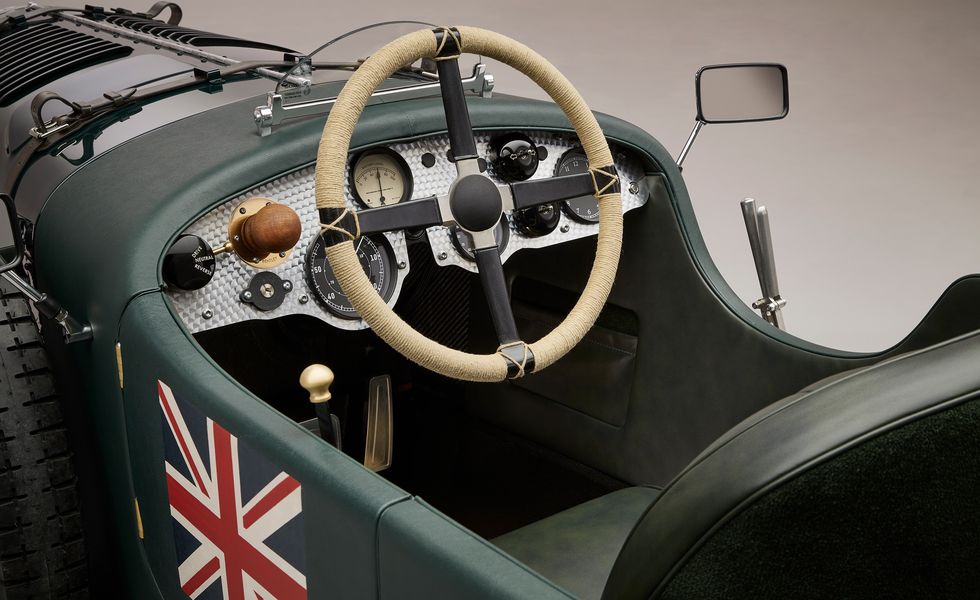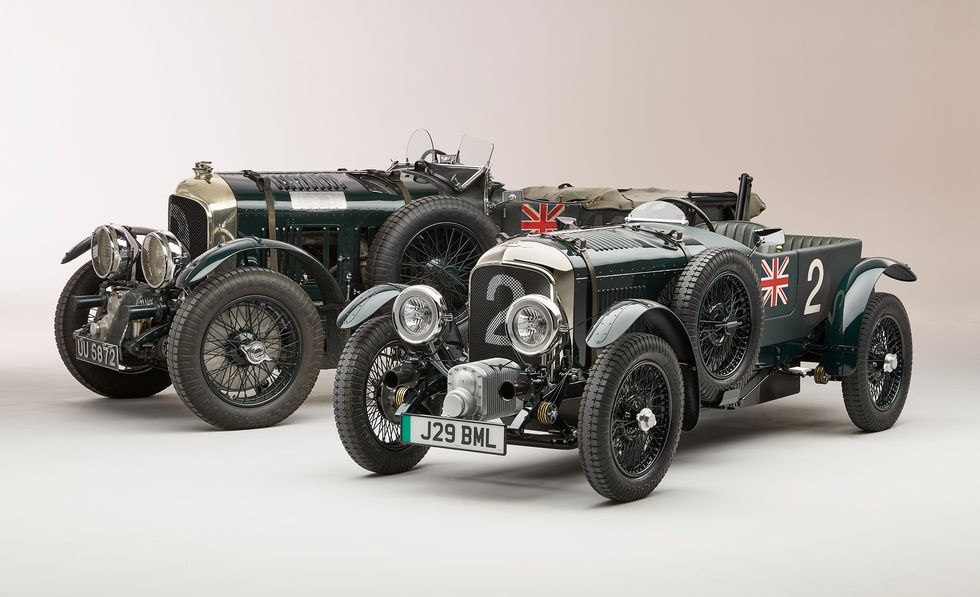- This 85 percent scale replica of original 1929 Blower is a Bentley-sanctioned product.
- It has a 20-hp electric motor and a 25 mph top speed, as it’s classified as a Neighborhood Electric Vehicle.
- It’s produced in the U.K. by Little Car Company (LCC) and is set to carry a six-figure price tag.
When Bentley built a “continuation” run of its famous 1920s ‘Blower’ it charged $2.1 million for each and limited production to just 12 cars, all of which were sold well before the program was officially announced. Now here is a chance for anybody who missed out on that allocation to get a very slightly downsized version of the same car in EV form: the Bentley Blower Junior.
Freshly unveiled at Monterey Car Week, the Blower Junior is another product from the Little Car Company in the U.K. This is the same outfit responsible for the Bugatti Baby II as well as other downsized and electrified classics including an Aston Martin DB5, Ferrari Testa Rossa and Jaguar E-Type—plus the forthcoming upsized Tamiya Wild One Max we told you about last month. But the Blower Junior is the most ambitious classic evocation so far, being both bigger—an 85 percent scale version of the original car—and also boasting what will be the novelty of street legality on both sides of the Atlantic.
Not that it will be suited to relaxed long distance touring. In Europe, the Blower Junior’s rear-mounted 20-hp electric motor will give it a top speed of 45 mph and allow it to be sold as an ‘L7e quadricycle’ that can be used on most roads except high-speed highways. But in the U.S., tougher legislation means the Junior will be regarded as a Neighborhood Electric Vehicle, limited to 25 mph and, in most states, unable to legally travel on any road with a posted speed limit higher than 35 mph. This means few American buyers are likely to ever test the claim that the Blower Junior will be able to manage around 65 miles of range under Europe’s WLTP testing methodology.
Regardless of the modest potential for speed, the Blower Junior is a beautiful thing. LCC employed many of the construction techniques used for the original car, including the hand-formed louvers in the center-hinged aluminum hood held in place by leather straps. The lack of an engine up front meant it was possible to see some non-prototypical daylight through these gaps when we saw the prototype version, but LCC says it is looking at ways to use the space for luggage accommodation—in other words, a very elegant frunk. The prototype already has a small amount of storage space within the carefully modeled fuel tank at the back of the car; without the need to carry gasoline, this hinges open to offer a lockable trunk. The 10.8-kWh, 48-volt battery pack sits beneath the floor and is recharged by a socket integrated into the cast ‘supercharger’ at the front of the car.
As with its earlier mini recreations, LCC has tried to keep the new Bentley chassis components similar to those of the original car, with elliptical springs and circular friction dampers at each corner. But in the interests of safety, the braking system is upgraded with hydraulic actuation for front discs and rear drums. The braking capability of the ‘continuation’ Blower was the least modern thing about it when we drove it two years ago, and the Junior will also have a conventional layout for its brake and accelerator pedals (the original car pre-dated standardization and had the brake on the right).
Beyond the electric drivetrain, some other details have been changed. The Blower Junior’s rear body is made from carbon fiber rather than a timber frame, although this is still surfaced in 1920s-spec impregnated fabric. The reduced dimensions of the new car also mean it adopts an unusual seating layout with the passenger offset to the right behind the driver. The need to meet safety standards for road use has also brought inelegant pillars for three-point seatbelts. The Junior’s polished aluminum dashboard is necessarily smaller than that of the original Blower, with fewer dials, but period details such as the use of domestic light switches have survived. And we love the string-wrapped steering wheel.
Junior drivers will have no need to try and deal with a recalcitrant pre-sychromesh ‘crash’ gearbox like those of the full-sized cars, as you merely have to choose between Drive and Reverse. There are also three power modes, selected by the spherical wooden handle tha, in the original car, was for the fuel pump. Comfort restricts the output to 2.7 hp, Bentley raises it to 10.7 hp, and Sport brings the full fury of 20hp. With that pitted against an occupant-free weight of around 1200 pounds, acceleration will likely be leisurely.
While considerably cheaper than the Continuation Blower, the Bentley Blower Junior is definitely not going to actually be cheap. LCC says that the limited-to-99 First Edition—all in British Racing Green with Union Jack flag on the side—will cost £90,000, or $115,000 at current exchange rates. That is serious coin for a car that can only do 25 mph, but not for a vintage Bentley.
This content is imported from poll. You may be able to find the same content in another format, or you may be able to find more information, at their web site.
Senior European Correspondent
Our man on the other side of the pond, Mike Duff lives in Britain but reports from across Europe, sometimes beyond. He has previously held staff roles on UK titles including CAR, Autocar and evo, but his own automotive tastes tend towards the Germanic, owning both a troublesome 987-generation Porsche Cayman S and a Mercedes 190E 2.5-16.
Read the full article here




